2022 leaves Europe in grip of energy crisis
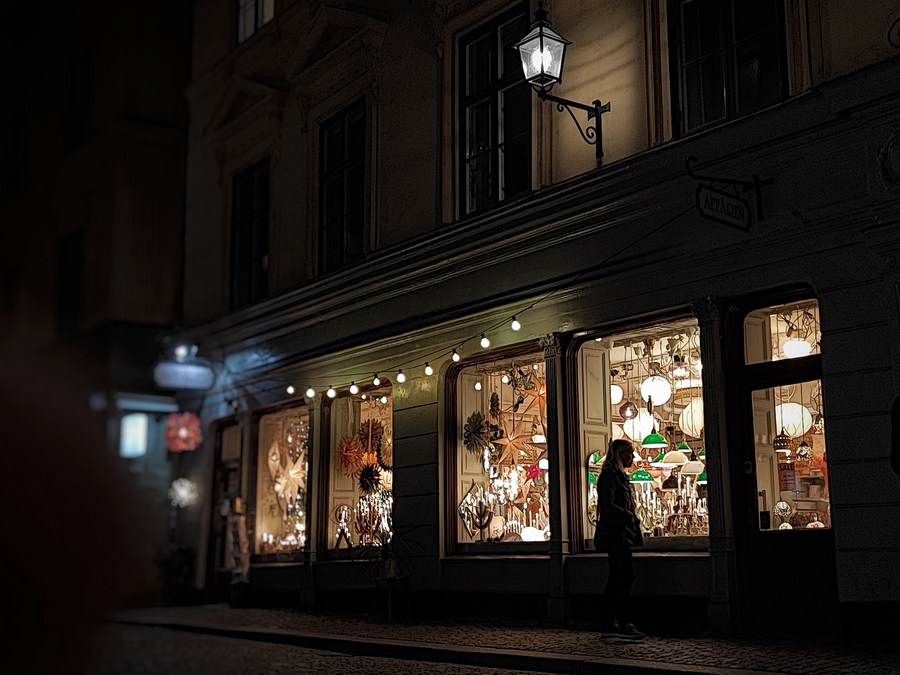
This photo taken on Oct. 28, 2022 shows a pedestrian looking into Hogberg's lighting shop in Stockholm's Old Town, Sweden. TO GO WITH "Feature: Swedes brace for dark, cold winter as energy crisis ravages Europe" (Photo by Patrick Ekstrand/Xinhua)
For Europe, uncertainties and challenges ahead will continue to weigh heavily upon the continent's economy as it tries to emerge from the energy crisis and record-breaking inflation, a double whammy that is wreaking economic havoc across the bloc.
VALLETTA, Dec. 28 (Xinhua) -- In Slovenia, Vukadinka Marija Pavlin does not turn on radiators all the way even when the weather gets cold, and washes clothes and dishes at night when electricity is at its cheapest. Thanks to her extreme frugality with electricity consumption, she has avoided the need to confront the significant rise in energy prices.
Thousands of families across Europe are in the same shoes. Many are struggling to save enough money to pay their energy bills or facing the "eat or heat" dilemma. Businesses are teetering toward bankruptcy due to the high production costs driven mainly by the record high energy prices.
Europe has been severely impacted by the sanctions it imposed on Russia after the outbreak of its conflict with Ukraine, leading to the ongoing energy crisis, complete with gas shortages and high energy prices. It is widely expected to last for some time.
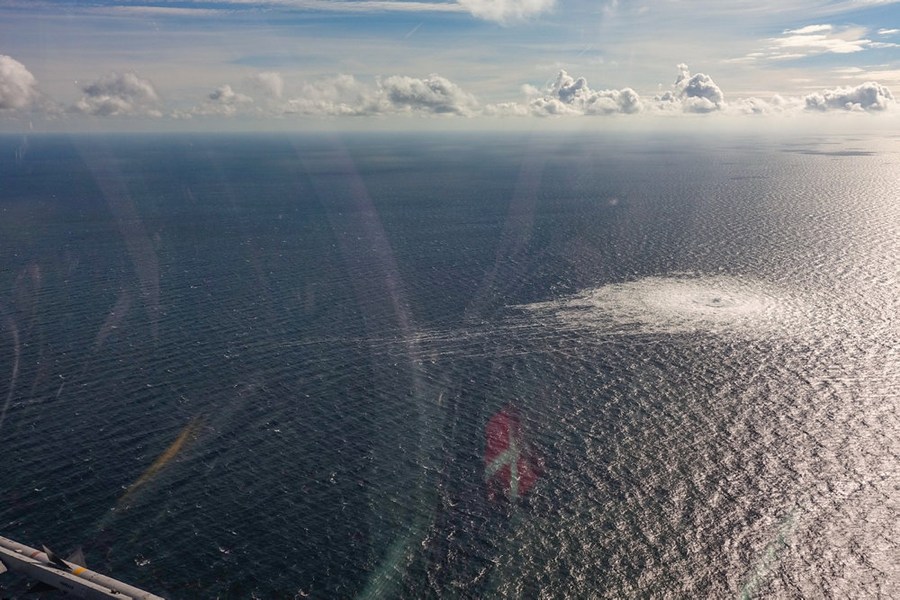
Aerial photo released by the Danish Ministry of Defense on Sept. 27, 2022 shows the Nord Stream gas pipeline leak site. (Danish Defense Ministry/Handout via Xinhua)
GAS SHORTAGE, RECORD PRICES
Europe is heavily dependent on Russian gas supplies. In 2021, the member states of the European Union (EU) imported 155 billion cubic meters (bcm) of natural gas from Russia, which accounted for about 45 percent of the bloc's gas imports and close to 40 percent of its total gas consumption, according to figures released by the International Energy Agency (IEA).
Since then, Russia's share of EU gas imports has declined to less than 10 percent. As a result, Europe must seek alternative sources, including purchasing expensive spot liquefied natural gas (LNG) from faraway gas-exporting countries, such as the United States.
In a bid to limit natural gas usage, certain European countries are burning more coal or extend the lifespan of nuclear power plants. This puts paid to plans to phase out the use of coal, the most polluting energy source.
Gas shortage has forced EU member states to agree on a voluntary 15 percent reduction of natural gas demand compared to the average consumption in the past five years between Aug. 1, 2022, and March 31, 2023. A mandatory 5 percent reduction of electricity consumption during peak hours has also been agreed until March 2023.
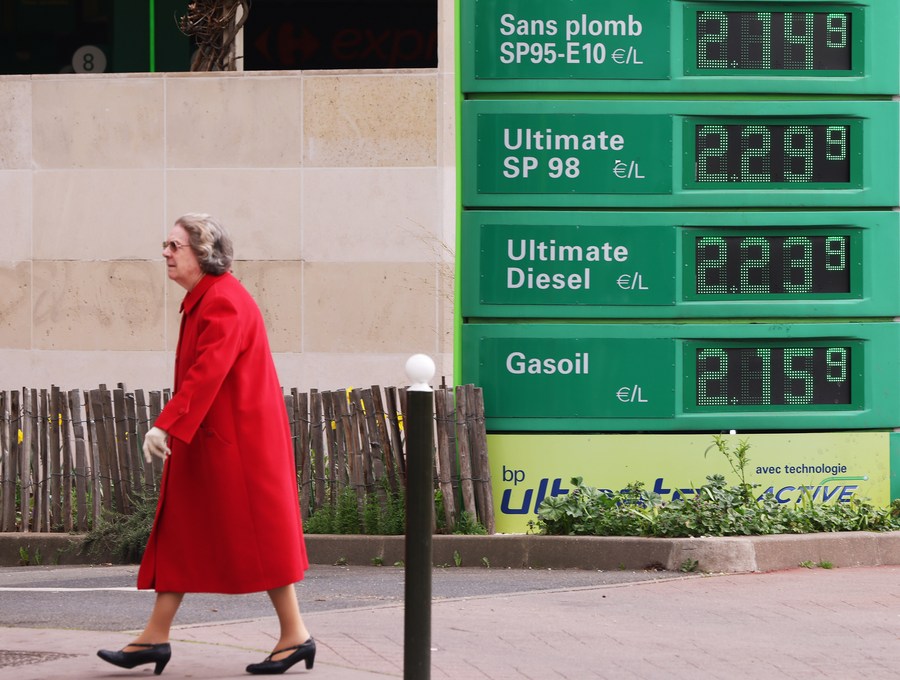
Fuel prices are displayed at a gas station in Paris, France, March 16, 2022. (Xinhua/Gao Jing)
Expensive gas imports, together with a supply shortage, have pushed up energy prices to record highs. The Dutch Title Transfer Facility (TTF) is Europe's main benchmark for natural gas prices. TTF gas prices reached historic levels back in August, climbing to over 340 euros (362 U.S. dollars) per megawatt hour (MWh). Prices have since fallen but remain at a high level. Two years ago, the TTF price was just about 14 euros per MWh.
With the aim of lowering energy prices, after months of wrangling, the EU member states' energy ministers finally clinched a deal on a market correction mechanism for natural gas, also known as a gas price cap, earlier this month.
Under the agreement, the mechanism will be triggered when gas prices exceed 180 euros per MWh, with inbuilt safeguards for suspension and deactivation so as not to endanger the gas market. However, market analysts doubt that the gas price cap will effectively lower the costs for consumers or businesses.
Along with the rocketing gas and electricity prices, fuel prices are also soaring in Europe. Though gasoline and diesel prices have slightly decreased recently, they hovered above more than 2 euros per liter in most European countries during most of 2022. Some European countries had to grant huge subsidies to cap fuel prices.

The lighting Eiffel Tower is seen in Paris, France, Sept. 22, 2022. Lights will be switched off at the Eiffel Tower at 23:45, as soon as the last tourist leaves, instead of the current 1:00 from Sept. 23 in order to help save energy. (Xinhua/Gao Jing)
ECONOMIES, HOUSEHOLDS STRUGGLING
Shutdowns, dismissals or even bankruptcies are what some energy-intensive companies in Europe, such as glassmakers or chemicals plants, are facing under the pain of the energy crisis.
The high gas and electricity prices have led to record high inflation, which in turn had a severe impact on the European economy and its citizens' livelihoods. Though the EU's annual inflation rate slightly declined in November from October, it remained at the two-digit level, 11.1 percent.
As in previous months, the highest contribution to the high annual inflation rate came from energy, with firms and families increasingly finding it difficult to keep up with the costs.

A staff member works at the Stergiou Family S.A. factory in Acharnes, a suburb of Athens, Greece, on Nov. 29, 2022. (Photo by Lefteris Partsalis/Xinhua)
Businesses in certain industries are forced to relocate or are facing bankruptcy, and some countries have injected liquidity into companies in difficulty. Many small business owners are also facing operational difficulties.
The European Commission in November predicted that the 27-nation EU would slide into recession this winter.
European industry is losing its competitiveness and appeals to investors due to high energy prices, Thomas Schaefer, brand chief executive officer (CEO) of German carmaker Volkswagen, said in late November.
"Europe lacks price competitiveness in many areas. When it comes to the cost of electricity and gas in particular, we are losing more and more ground," he said.
The EU therefore announced a series of measures, such as a cap on gas prices, a "solidarity levy" on excess profits made by oil, gas, coal and refinery companies in 2022, and a cap on the revenues of electricity companies that produce energy from wind, solar and nuclear power.
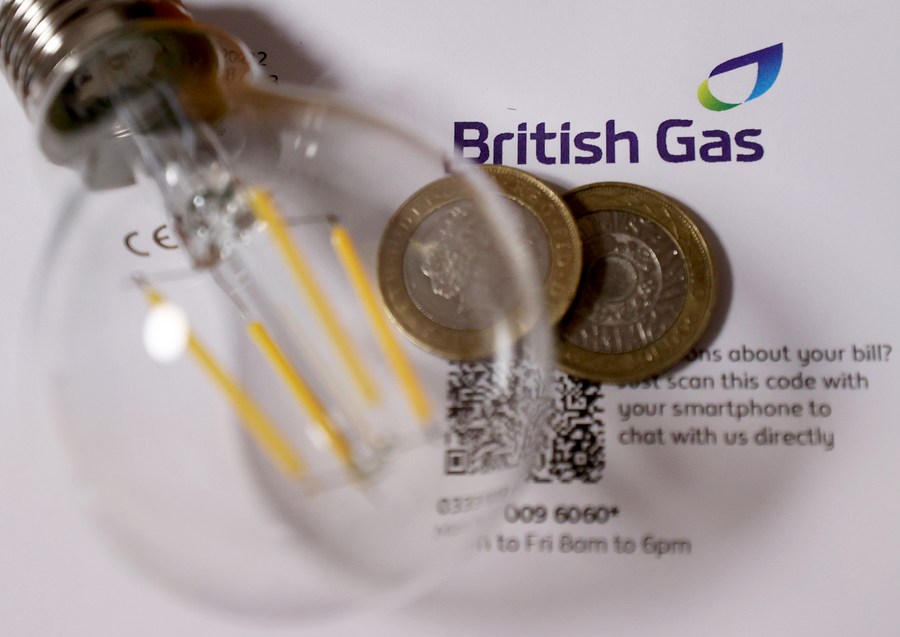
Photo taken on Oct. 7, 2022 shows a bulb on a household bill in London, Britain. British households could face blackouts this winter if there are reduced European electricity imports and insufficient gas supplies in the country, a report warned. (Xinhua/Li Ying)
Meanwhile, families in increasing numbers are facing energy poverty, with some having to choose between food and heating as they are unable to pay their high energy bills.
"A lot of households are already in the position of no heat and less to eat, and I really wish politicians would get it through their heads that some householders are really in a dire situation," said Keith Baker, a research fellow in fuel poverty and energy policy at Glasgow Caledonian University in Scotland.
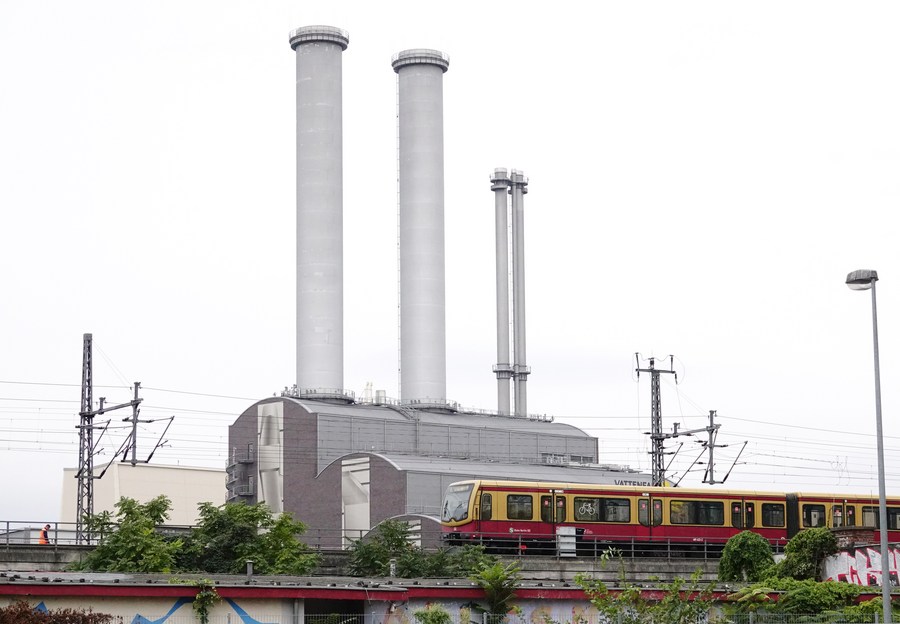
A train passes a thermal power plant in Berlin, Germany, Sept. 8, 2022. (Xinhua/Ren Pengfei)
CHALLENGES AHEAD
Energy prices will not begin to stabilize until the end of the Russia-Ukraine conflict is in sight, Alessandro Marangoni, an economist and director of Irex Monitor, an Italian think tank specializing in the energy sector, told Xinhua recently.
Europe is scrambling to find alternatives to Russian energy amid the conflict in Ukraine and the sanctions imposed on Russia. With consumers facing the highest energy prices on record, and potential gas rationing and blackouts this winter, there are fears of an even worse crisis next year.
The EU could face a shortfall of nearly 30 bcm of natural gas in 2023, according to a report issued recently by the IEA. The agency predicted that the EU's potential gas supply-demand gap could reach 7.6 percent of the EU's total natural gas baseline demand, which is estimated at 395 bcm for 2023.
The IEA cautioned that the unseasonably mild temperatures seen at the start of the European winter are not guaranteed to last, and Russian gas supplies could be reduced even further. Meanwhile, global LNG supply is expected to increase by only 20 bcm in 2023, much less than the probable reduction in Russian pipeline deliveries, according to the IEA.
The EU's Economy Commissioner Paolo Gentiloni has said that if the conflict between Russia and Ukraine does not end by next winter, Europe's energy woes will worsen dramatically.

Cars line up for fuel outside a gas station in Lille, north France, Oct. 6, 2022. (Photo by Sebastien Courdji/Xinhua)
European utilities are resilient but not immune to crises and they will continue to be affected by opposing forces in 2023, said ING senior economist Gerben Hieminga.
Dalibor Pudic, president of the Croatian Gas Association, told Xinhua that 2023 will be a "very challenging" year if Russia further cuts supplies to Europe. The EU will have to fill its storage facilities again, which "won't be easy."
Pudic warned that without government subsidies, the already high energy prices for households and businesses will skyrocket.
For Europe, uncertainties and challenges ahead will continue to weigh heavily upon the continent's economy as it tries to emerge from the energy crisis and record-breaking inflation, a double whammy that is wreaking economic havoc across the bloc. (1 euro = 1.07 U.S. dollars)
Photos
Related Stories
- Right-wing surging in Europe, long-term impact still uncertain
- China's Shanxi increases coalbed methane production to ensure energy supply
- Yearender: Extreme weather events in Europe sound alarm on climate change
- Cost-of-living crisis casts shadow over Christmas in Europe
- Record inflation prompts strike action across Europe
Copyright © 2022 People's Daily Online. All Rights Reserved.









